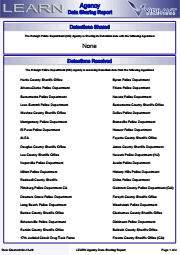License Plate Recognition Data (Raleigh Police Department)
It is a clone of this request.
| Multi Request | License Plate Recognition Data |
| Submitted | Feb. 11, 2020 |
MuckRock users can file, duplicate, track, and share public records requests like this one. Learn more.
Communications
From: Madeleine Chinery
To Whom It May Concern:
Pursuant to the North Carolina Public Records Law, I hereby request the following records:
Part A: Information related to Automated License Plate Reader (ALPR) data sharing.
1) The names of agencies and organizations with which the Agency shares ALPR data;
2) The names of agencies and organizations from which the Agency receives ALPR data;
3) The names of agencies and organizations with which the Agency shares “hot list” information;
4) The names of agencies and organizations from which the Agency receives “hot list” information;
Part B: Information Related to Numbers of “Detections” (plate scans) and “Hits” (plate scans that matched to a hotlist)
5) The aggregate number of detections collected during 2018;
6) The aggregate number of “hits” during 2018;
7) The aggregate number of detections collected during 2019;
8) The aggregate number of “hits” during 2019.
I am part of a team of students and journalists compiling data on ALPR use from agencies around the country. This information will be useful to academics, journalists, members of the public, and other law enforcement agencies. So far, hundreds of agencies across the United States have already provided this data. You can see many of the previous results here: https://www.eff.org/pages/explore-alpr
For items 1-4: This information is easily available within the Agency’s Vigilant Solutions LEARN system. The simplest way to extract this data is to generate an “Agency Data Sharing Report” PDF file from within LEARN. To do this, a user may simply go to the “Sharing” section of LEARN and select “Output Report.” A CSV/XLS file containing these records would also satisfy this request.
The instructions for extracting this data is described on pages 62-63 of the LEARN Agency Manager Guide, which may be found at this link:
https://www.documentcloud.org/documents/3860685-LEARN-5-1-Agency-Manager-Guide.html
For items 5-8: This information is easily available within the Agency’s Vigilant Solutions LEARN system. The simplest way to extract this data is to generate a “Dashboard Hit Ratio Report” PDF file from within LEARN. We would prefer the data for each year to be provided separately.
The instructions for extracting this data is described on pages 78-79 of the LEARN Agency Manager Guide, which may be found at this link:
https://www.documentcloud.org/documents/3860685-LEARN-5-1-Agency-Manager-Guide.html
The requested documents will be made available to the general public, and this request is not being made for commercial purposes.
In the event that there are fees, I would be grateful if you would inform me of the total charges in advance of fulfilling my request. I would prefer the request filled electronically, by e-mail attachment if available or CD-ROM if not.
Thank you in advance for your anticipated cooperation in this matter. I look forward to receiving your response to this request within 10 business days.
Sincerely,
Madeleine Chinery
From: Raleigh Police Department
Hello,
Please find information attached and below that is responsive to your public records request:
#1 through #4: See the attached Data Sharing Reporting from LEARN.
#5: Pursuant to NC General Statute 20-183.32 and Raleigh Police Department policy, ALPR detections are not preserved for more than 90 days after the date the data is captured. Therefore, it is impossible to determine how many detections were collected during 2018.
#6: Pursuant to NC General Statute 20-183.32 and Raleigh Police Department policy, ALPR detections are not preserved for more than 90 days after the date the data is captured. Therefore, it is impossible to determine how many “hits” were collected during 2018.
#7: Pursuant to NC General Statute 20-183.32 and Raleigh Police Department policy, ALPR detections are not preserved for more than 90 days after the date the data is captured. Therefore, it is impossible to determine how many detections were collected during 2019.
#8: Pursuant to NC General Statute 20-183.32 and Raleigh Police Department policy, ALPR detections are not preserved for more than 90 days after the date the data is captured. Therefore, it is impossible to determine how many “hits” were collected during 2019.
Respectfully,
Dia
Donna-maria Harris, RPD Public Affairs Manager
-

~WRD191
Files
pages
